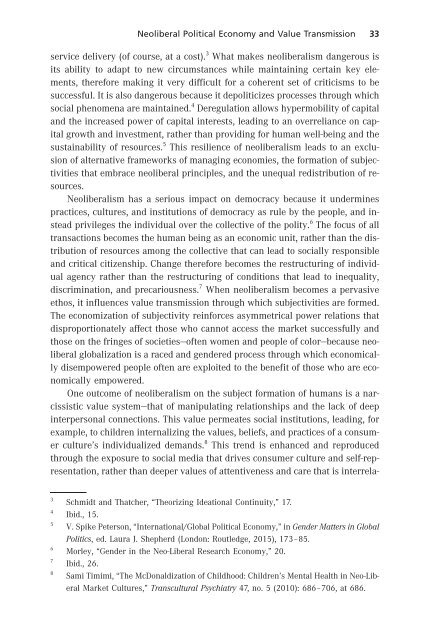Piet Naudé | Michael Welker | John Witte, Jr. (Eds.): The Impact of Political Economy (Leseprobe)
In our late modern pluralistic societies, there are tensions and complementarities between a plurality of individual and social claims and activities to shape societal life and a constructive pluralism of what is known as social systems. The latter provide normative codes and powers emanating from the areas of law, religion, the family, the market, the media, education, academic research, health care, defense and politics. A better understanding and steering of this complex division of powers is crucial for the common good and for freedom and peace. In this volume, a multi-disciplinary team of experts from Germany, Italy, Australia, the UK, the USA, and South Africa bring their conceptual, empirical and historical insights to bear in three broad sections: »The moral dimension of social systems«; »The interaction of religion, law and education with political systems«; and »The moral (mal)-formation evident in case studies on the global financial crisis and social media«.
In our late modern pluralistic societies, there are tensions and complementarities between a plurality of individual and social claims and activities to shape societal life and a constructive pluralism of what is known as social systems. The latter provide normative codes and powers emanating from the areas of law, religion, the family, the market, the media, education, academic research, health care, defense and politics. A better understanding and steering of this complex division of powers is crucial for the common good and for freedom and peace.
In this volume, a multi-disciplinary team of experts from Germany, Italy, Australia, the UK, the USA, and South Africa bring their conceptual, empirical and historical insights to bear in three broad sections: »The moral dimension of social systems«; »The interaction of religion, law and education with political systems«; and »The moral (mal)-formation evident in case studies on the global financial crisis and social media«.
Create successful ePaper yourself
Turn your PDF publications into a flip-book with our unique Google optimized e-Paper software.
Neoliberal <strong>Political</strong> <strong>Economy</strong> and Value Transmission 33<br />
service delivery (<strong>of</strong> course, at acost). 3 What makes neoliberalism dangerous is<br />
its ability to adapt to new circumstances while maintaining certain key elements,<br />
therefore making it very difficult for acoherent set <strong>of</strong> criticisms to be<br />
successful. It is also dangerous because it depoliticizes processes through which<br />
social phenomena are maintained. 4 Deregulation allows hypermobility <strong>of</strong> capital<br />
and the increased power <strong>of</strong>capital interests, leading to an overreliance on capital<br />
growth and investment, rather than providing for human well-beingand the<br />
sustainability <strong>of</strong> resources. 5 This resilience <strong>of</strong> neoliberalism leads to an exclusion<br />
<strong>of</strong> alternative frameworks <strong>of</strong> managing economies, the formation <strong>of</strong> subjectivities<br />
that embrace neoliberal principles, and the unequal redistribution <strong>of</strong> resources.<br />
Neoliberalism has aserious impact on democracy because it undermines<br />
practices, cultures, and institutions <strong>of</strong> democracy as rule by the people, and instead<br />
privileges the individual over the collective <strong>of</strong> the polity. 6 <strong>The</strong> focus <strong>of</strong> all<br />
transactionsbecomes the human being as an economic unit, rather than the distribution<br />
<strong>of</strong> resources among the collective that can lead to socially responsible<br />
and critical citizenship. Change therefore becomes the restructuring <strong>of</strong> individual<br />
agency rather than the restructuring <strong>of</strong> conditions that lead toinequality,<br />
discrimination, and precariousness. 7 When neoliberalism becomes apervasive<br />
ethos, it influences value transmission through which subjectivities are formed.<br />
<strong>The</strong> economization <strong>of</strong> subjectivity reinforces asymmetrical power relations that<br />
disproportionately affect those who cannot access the market successfully and<br />
those on the fringes <strong>of</strong> societies—<strong>of</strong>ten women and people <strong>of</strong> color—because neoliberal<br />
globalization is araced and gendered process through which economically<br />
disempowered people <strong>of</strong>ten are exploited to the benefit <strong>of</strong> those who are economically<br />
empowered.<br />
One outcome <strong>of</strong> neoliberalism on the subject formation <strong>of</strong> humans is anarcissistic<br />
value system—that <strong>of</strong> manipulating relationships and the lack <strong>of</strong> deep<br />
interpersonal connections. This value permeates social institutions, leading, for<br />
example, to children internalizing the values, beliefs, and practices<strong>of</strong>aconsumer<br />
culture’s individualized demands. 8 This trend is enhanced and reproduced<br />
through the exposure to social media that drives consumer culture and self-representation,rather<br />
than deeper values <strong>of</strong> attentiveness and care that is interrela-<br />
3<br />
4<br />
5<br />
6<br />
7<br />
8<br />
Schmidt and Thatcher, “<strong>The</strong>orizing Ideational Continuity,” 17.<br />
Ibid., 15.<br />
V. Spike Peterson, “International/Global <strong>Political</strong> <strong>Economy</strong>,” in Gender Matters in Global<br />
Politics, ed. Laura J. Shepherd (London: Routledge, 2015), 173–85.<br />
Morley, “Gender in the Neo-Liberal Research <strong>Economy</strong>,” 20.<br />
Ibid., 26.<br />
Sami Timimi, “<strong>The</strong> McDonaldization <strong>of</strong> Childhood: Children’sMental Health in Neo-Liberal<br />
Market Cultures,” Transcultural Psychiatry 47, no. 5(2010): 686–706, at 686.
















